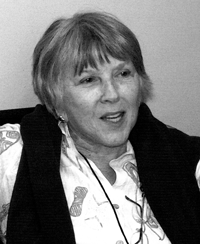By Ed Gold
Phyllis W. Meadow, a Villager who pioneered relentlessly to gain public acceptance of psychoanalysis as an independent profession, and who profoundly increased understanding of the subject in the United States and abroad, died last Thursday at St. Vincent’s Hospital from cancer, She was 80 years old.
Energetic and single-minded, she founded a modest educational empire in the Northeast with sister schools in Greenwich Village and Boston, and with the Boston school adding a unit in Dummerston, Vt., where she owned a large tract of land.
In Greenwich Village she established the Center for Psychoanalytic Studies on W. 10th St., in Boston the Boston Graduate School of Psychoanalysis and in Vermont the Cyril Z. Meadow Institute.
As author, scholar, teacher, lecturer and activist, Meadow created a distinctive body of knowledge that earned respect for psychoanalysis despite much skepticism from critics in the medical field.
She became interested in psychoanalysis, which deals with the study of the unconscious, “when I stumbled on Freud while teaching literature in a graduate school,” she once wrote. She added that she “found an explanation for all the troubling emotions that limited satisfaction of many of the drives surfacing in young adulthood.”
Her daughter, Dena Reed, who is a psychiatrist and is now president of the Boston school succeeding her mother, notes that her mother’s early life “did not indicate she would be a driving force in the field of psychoanalysis.”
Born in Boston in 1924, Meadow grew up in Watertown, Mass., went to high school there, and then earned a bachelor’s degree at the University of Maryland. There she met the noted sociologist, C. Wright Mills, who was “the first person to tell me I was very smart,” she once mentioned to her daughter.
She had majored in English at college and later came to New York to work for Charm magazine, writing about women’s careers, which in those days was pretty avant-garde.
In the ’50s, she lived the life of a bohemian in the Village, and was frequently seen enjoying herself at the White Horse Tavern.
But Freud must have stayed in her head because she decided to get a doctorate at New York University, after which she enrolled in courses at a W. 13th St. school called National Psychological Association for Psychoanalysis.
A teacher at N.P.A.P., Hyman Spotnitz, a psychiatrist and analyst, became her mentor. She was intrigued with his theory of technique in dealing with patients who were narcissistic. He inspired her and other students and teachers to sponsor a series of 16 lectures in a house on W. 10th St. that drew very heavy interest.
Meadow went into action. Building on Spotnitz’s theory, she opened her Village school on W. 10th St. in 1971 and the sister school in Boston two years later.
In the late ’80s, she married Cyril Meadow, whose background was in the garment industry and knew nothing about psychoanalysis. It was her third marriage. With solid business experience, her new husband put himself at her disposal and was completely devoted to her educational interests.
In addition to writing books and articles, teaching at her schools and other schools in the U.S. and Europe, battling for accreditation and against legislative discrimination, Meadow was an active therapist.
Even before opening her schools, she had purchased a brownstone residence on W. 13th St., where she opened an office and later maintained a heavy therapy schedule for individuals as well as groups.
For more than 30 years she was on the go, visiting the Boston and Vermont facilities, and traveling as far as California and Ireland to give courses.
Her most recent book, “The New Psychoanalysis,” published last year, focused on the power of unconscious forces driving human behavior.
She had a reputation for being original, plain spoken, inner directed, provocative and “never afraid,” according to her daughter, adding that Meadow had been working on a new book that would definitely raise eyebrows. Its subject is ethics.
“My mother worried about people being too rigid about universal ethical standards,” Reed said. “She used to say: ‘There’s ethics raising its ugly head again.’” No decision has been made as to whether the manuscript is complete enough for publication.
Survivors, in addition to her daughter, include her son-in-law, James Reed; three grandchildren, Rebecca, Emanda and Zachary; and two half-sisters, Susan Winbourne and Jessie Roland.
A visitation at her home was held last Saturday, and a memorial service is being planned. No funeral service was held, and Meadow chose cremation.






































